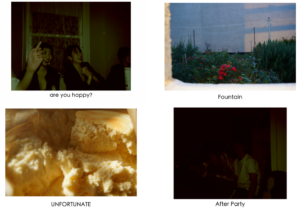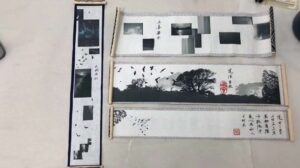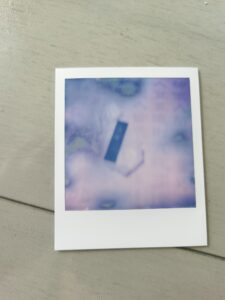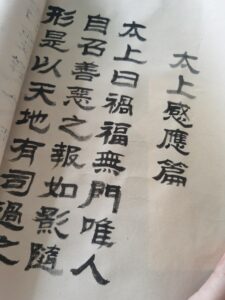Study Plan
Study plan
The work I want to do is based on the two projects I had done last year. The one is called ‘I Close to Happy’, which is about depression. The other is called ‘Tao Rules the Nature’, which is about Taoism.
 (I Close to Happy, Derek Cai, 2019)
(I Close to Happy, Derek Cai, 2019)
 (Tao Rules the Nature, Derek Cai, 2019)
(Tao Rules the Nature, Derek Cai, 2019)
The reason I choose to do artwork about Taoism is that Taoism helps me get better from emotion problems. Meditation, reading Taoism scripture and calligraphy help me feels peaceful and make me more concentrated.
And for art, I also get confused in some time. What is art? What is good art? What compels us to link the present situation with a past moment? How do we prevent such a discourse from becoming maudlin retrospection? Our attempt to answer these questions must proceed from a single premise: yesterday’s problems are also today’s problems. More specifically, the cultural dilemmas we now face are rooted in the not-so-distant past. Artists and researchers today, both young and old, must consider how to better coexist with the world. When art and culture no longer operate at the spiritual vanguard of the era, is it possible for us to work alongside the public to build another kind of culture?
In the tao-tih king (one of the most important scripture) lao-tsze has elaborated his idea of the relations existing between the Universe and that which he calls Tao. The primary meaning of this name of a thing which he declares to be “without names”, is “The Way”; hence it has acquired the symbolical meaning of “the right course of conduct”, “reason”, and it also signifies “the Word”(Logos). By all these meanings it has been severally rendered by the translators of Lao-tsze’s celebrated work. In support of each rendering it is possible to adduce quotations from the text, but none is the equivalent of Lao-tsze’s Taou. The word Tao is not the invention of Lao-tsze. It was constantly in the mouth of Confucius, and with him it meant the “Way”. The Buddhists also used it in the sense of “Intelligence,” and called their co-religionists Tao-jin, or “Men of Intelligence.” If we were compelled to adopt a single word to represent the Tao of Lao-tsze, we should prefer the sense in which it is used by Confucius, “the Way.” “If I were endowed with prudence, I should walk in the great Tao… The great Tao is exceedingly plain, but the people like the foot-paths,” said Lao-tsze. But it is more than the way and the way-goer. It is an eternal road; along it all beings and things walk; but no being made it, for it is Being itself; it is everything and nothing, and the cause and effect of all. All things originate from Tao, conform to Tao, and to Tao at last they Return.
Tao is impalpable. You look at it, and cannot see it. You listen to it, and you cannot hear it. You touch it, and you cannot reach it. You use it, and cannot exhaust it. It is not to be expressed in words. It is still and void, it stands alone and changes not; it circulates everywhere and is not endangered. It is ever inactive, and yet leaves nothing undone. From it phenomena appear, through it they change, in it they disappear. Formless, it is the cause of form. Nameless, it is the origin of heaven and earth; with a name, it is the mother of all things. It is the ethical nature of the good man and the principles of his action. If we had then to express the meaning of Tao, we should describe it as the Absolute, the totality of Being and Things; the phenomenal world and its order; and the ethical nature of the good man and the principle of his action.
Meditating and contemplating use simple and illogical questions to divorce thinking from the realm of rationality and try to get closer to even the unreachable pre-linguistic realm. As human beings, the daily reality we experience is based on a matrix of ideological symbols formed through language. Therefore, the boundaries of possibilities that our wisdom can reach are covered and bounded by the symbolic chain generated by this system. Only vision, as a non-material product, is closer to a pure concept.
Eastern philosophy has always recommended that people maintain absolute calm and the evolution of the thinking process to achieve an intuitive experience of the statement. In order to achieve this goal, our attention should be focused on the most basic form of existence in the universe. I planned to do a group of photos explores the truth and hidden laws of things beneath the surface through simplification and abstraction. For example, Zhuangzi’s aesthetics is not to say anything, exploring the spirituality and intuition before symbolization, trying to preserve the castrated part of the image after language and text conversion.
Methods
- Analogue (Konica)/ Polaroid 2000
- photo-etching/ mono-print
- print on tiles or tortoise shell (not sure if the technique can be achieve)
- visiting Taoism temples
- Artists research
Some Practices






Recent comments